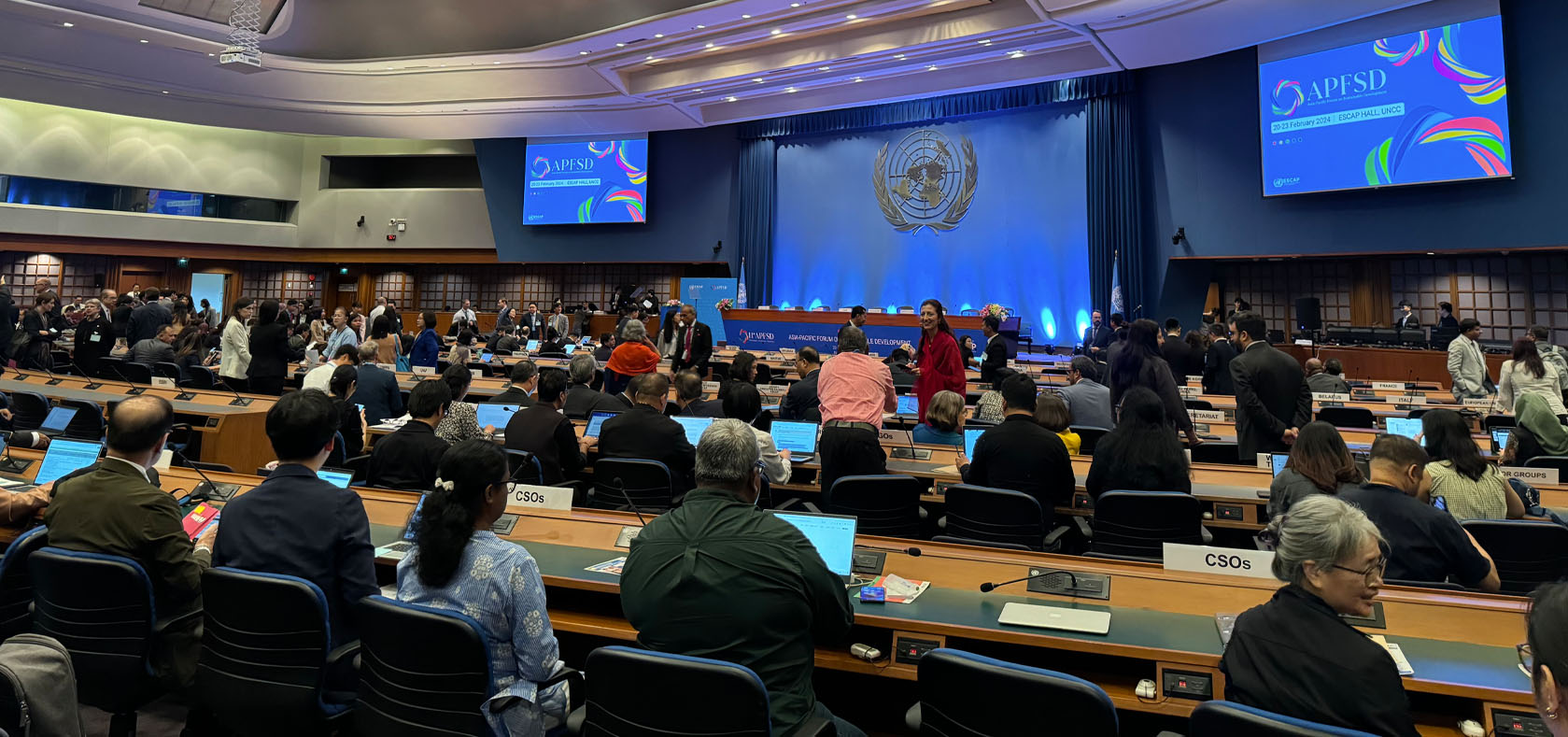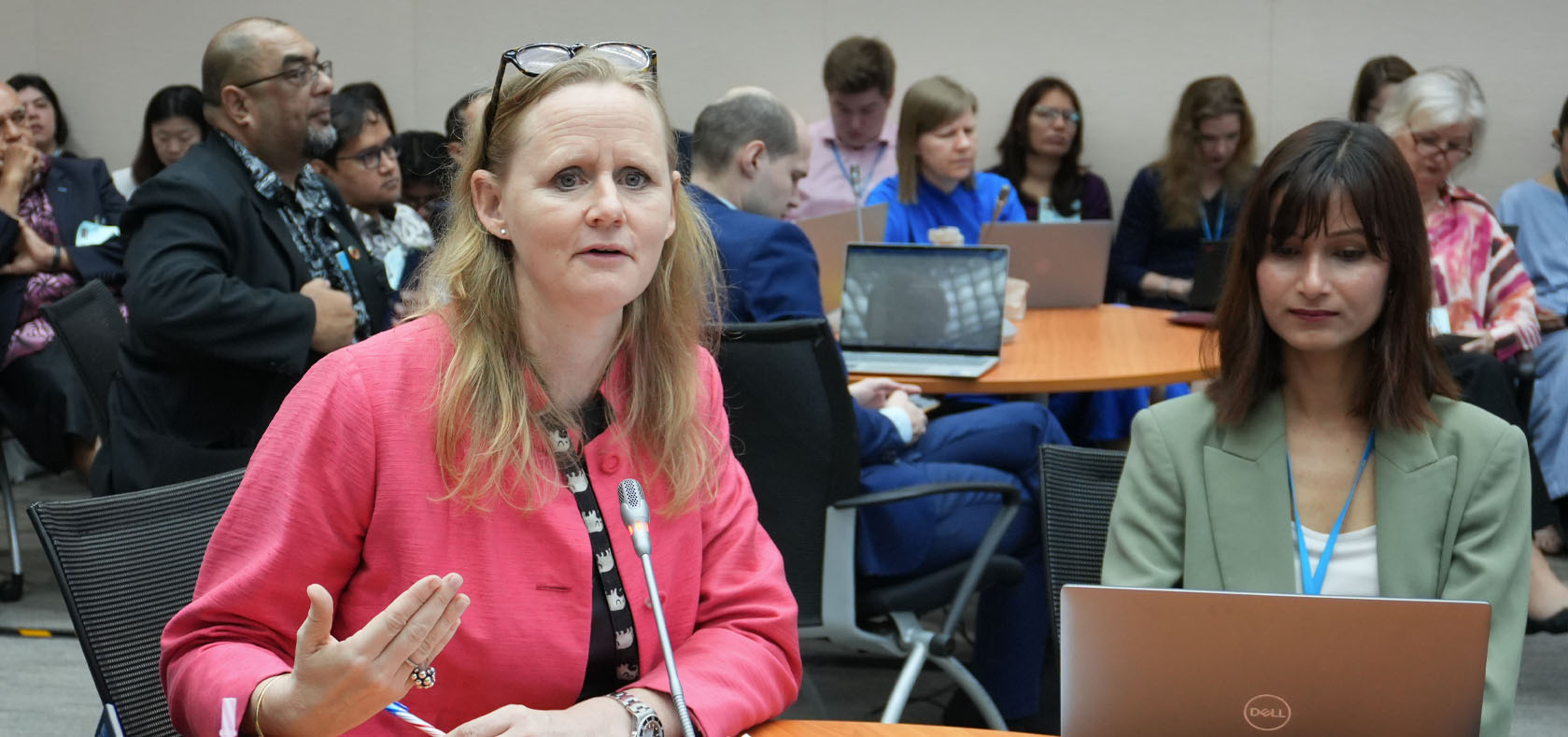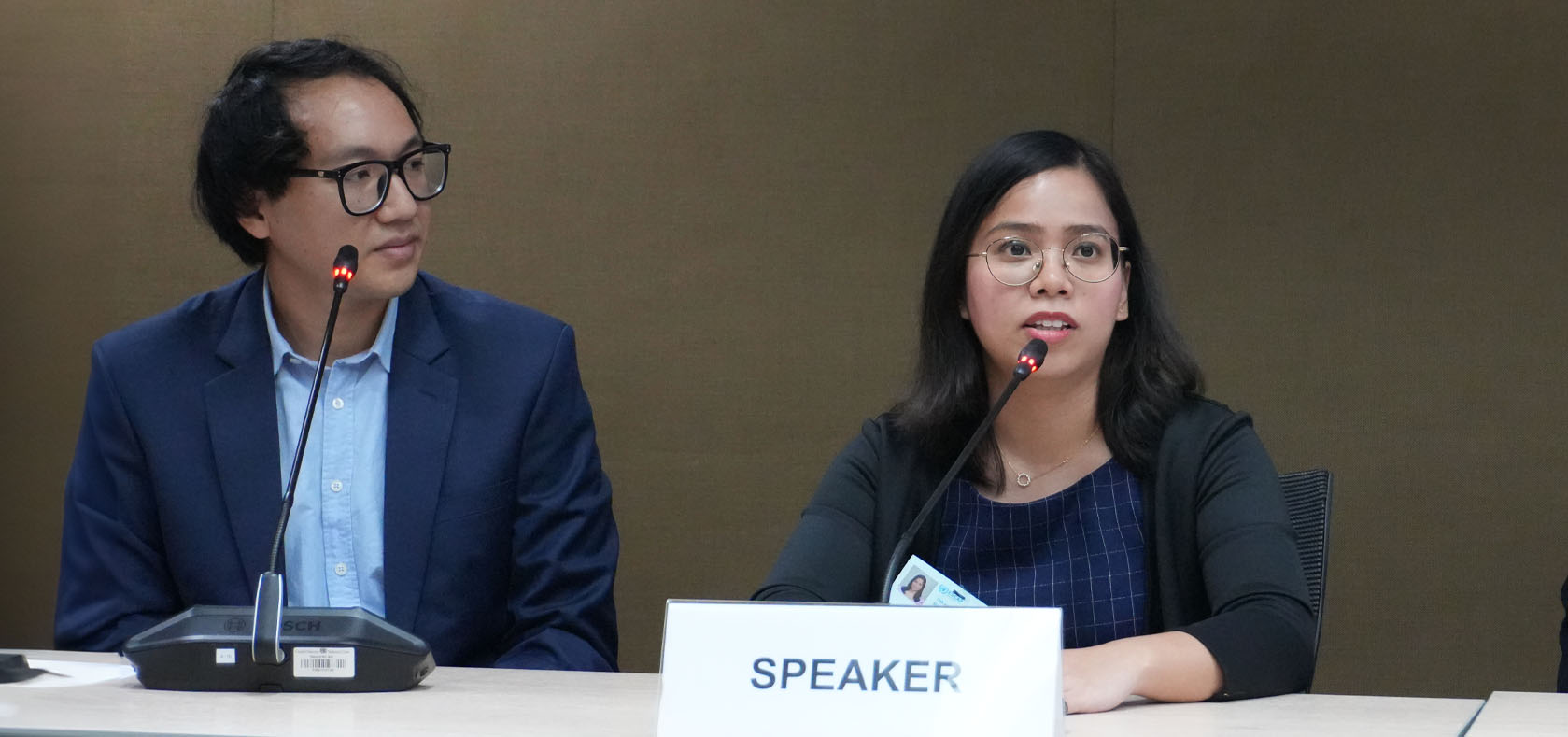Gender Highlights at Asia-Pacific Forum on Sustainable Development 2024
Date:
Authors: Trish Albay and Zoya Khanday

Bangkok, Thailand — UN Women put gender at the centre of sustainable development discussions as governments from across Asia and the Pacific, together with international organizations, civil society, and United Nations bodies convened for the 11th edition of the Asia-Pacific Forum on Sustainable Development (APFSD).
Organized by the United Nations Economic and Social Commission for Asia and the Pacific (UNESCAP), APFSD is an annual, inclusive intergovernmental forum to support follow-up and review of progress on the 2030 Agenda for Sustainable Development and the Sustainable Development Goals (SDGs) at the regional level.
This year, APFSD took place from 20-23 February under the theme: “Reinforcing the 2030 Agenda for Sustainable Development and eradicating poverty in times of multiple crises: The effective delivery of sustainable, resilient and innovative solutions in Asia and the Pacific” at the United Nations Conference Center (UNCC) in Bangkok, Thailand, and online.
“In this journey towards sustainable development, it is also imperative to embed gender equality as a core principle, recognizing women's empowerment as essential for driving economic growth and innovation,” highlighted Armida Salsiah Alisjahbana, Under-Secretary-General of the United Nations and Executive Secretary of UNESCAP, in her opening remarks.
The event included five roundtables with one SDG under review per roundtable: SDG 1 (No Poverty), SDG 2 (Zero Hunger), SDG 13 (Climate Action), SDG 16 (Peace, Justice and Strong Institutions) and SDG 17 (Partnerships for the Goals).
As part of its engagement in the Forum, UN Women organized a side event and contributed to two SDG roundtables to ensure a gender perspective was included in the discussions throughout the event.
Ending Poverty
On 21 February, Katja Freiwald, Women’s Economic Empowerment and Migration Lead, and Feroza Sanjana, Policy Research and M&E Consultant at UN Women Regional Office for Asia-Pacific, co-moderated a breakout discussion on decent jobs for poverty reduction at the SDG 1 Roundtable. Focused on progress and challenges on the path to ending poverty, governments recognized care as an important growth sector for job creation that can contribute to employing the youth in decent jobs while contributing to reduce poverty.

🤔 How can we accelerate progress on SDG 13 #ClimateAction in the #AsiaPacific and place gender equality at the centre of our efforts?
— UN Women AsiaPacific (@unwomenasia) February 27, 2024
Noralene Uy, Assistant Secretary at 🇵🇭 @DENROfficial, shares some of the priority actions discussed at the #APFSD. pic.twitter.com/z5HLOsPmRM
In its recommendations, the roundtable highlighted the need to create skilled, labour-intensive jobs for youth, including through the care sector, recognizing the need for job-ready skills to attract and retain talent and provide decent working conditions.
Climate Action
During the SDG 13 Roundtable on 22 February, the participants highlighted that effective governance for climate action requires institutional coordination, inclusion and partnerships with diverse groups, such as women, youth, indigenous peoples, and local communities in decision-making. This ensures that their needs are considered when developing strategies and plans, especially since they are disproportionately impacted by climate change.
Maria Holtsberg, Humanitarian, Disaster Risk Reduction and Climate Portfolio Lead at UN Women, presented seven priority actions to expedite SDG13, such as increasing ambition in Nationally Determined Contributions (NDCs), scaling up the mobilization and aligning of finance for climate action and improving production, accessibility and utilization of gender and environment data.

Youth and Green Transition
On 23 February, UN Women also co-organized the side event “Engaging Youth in a Green and Just Economy Transition at Scale” together with the Young Empowerment in Climate Action Platform (YECAP), UN Development Programme (UNDP), UN Environment Programme (UNEP), UN Children’s Fund (UNICEF) and International Labour Organization (ILO).
The event discussed how a green economy has the potential to overcome the problem of unemployment. However, youth are severely underrepresented in this paradigm shift. Youth must be supported in driving the just energy transition and adapting to new employment opportunities in the shift to a green economy.

Sam Tamayo, UN Women's 30 for 2030 Network Member and Founder of 🇵🇭 Project SMILE, was among the youth delegates at the #APFSD.
— UN Women AsiaPacific (@unwomenasia) February 29, 2024
Let's hear from Sam about her experience – from speaking at the side event on youth and just economy transition to joining the SDG Story Exchange. pic.twitter.com/CTdfFGVP0p
Sabrina (Sam) Tamayo, youth panelist from the Philippines and member of UN Women’s 30 for 2030 Network, shared that her youth-led, non-profit organization Project SMILE is an inaugural member of the National Economic and Development Authority’s “Stakeholders’ Chamber on the SDGs.”
“By being a part of this committee, we can put forward the issues faced, strategies and recommendations by youth on the national level, thereby informing the decision-making of the government. As such, stakeholders can ensure a just transition to a green economy that is more accessible to young women and girls, enabling them to contribute meaningfully to sustainable development and climate action while advancing their rights and wellbeing,” Tamayo added.
Social Protection
Ahead of the APFSD, UN Women also supported the side event “New frontiers on social protection in a changing world: Towards a vision for shared progress in Asia Pacific,” highlighting crucial perspectives on the importance of essential care provision for all as an inseparable component of social protection systems. Globally, millions of women shoulder a disproportionate burden of care work for children, the elderly, and the sick. There is a need to ensure accessibility, affordability, and quality care as a right for all.
In addition, the side event also highlighted how climate change is disproportionately affecting women, persons with disabilities, children and marginalized groups who often lack the resources and capabilities to cope with complex shocks. Social protection can play a protective, preventive, and transformative role in climate mitigation strategies, ensuring that vulnerable populations are integrated into environmentally friendly shifts and helping manage workforce transitions, ensuring an equitable “just” transition.

“Social protection and climate change adaptation are mutually reinforcing in that they improve capacities to respond to and anticipate the impact of climate change while strengthening opportunities for vulnerable groups,” said Noralene Uy, Assistant Secretary for Policy, Planning and Foreign-Assisted and Special Projects, Department of Environmental and Natural Resources of the Philippines.